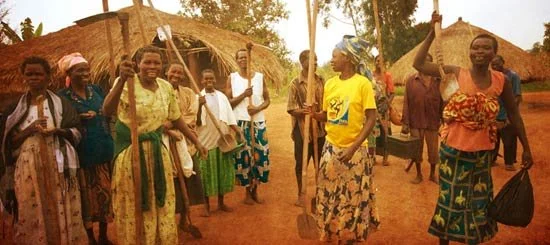Introducing Hiinga
My friend Andy Kristian wears many hats. When he’s not traveling through East Africa on humanitarian photography assignments, he’s in Lancaster, Pennsylvania, working with his wife as a wedding photographer and videographer. And he has just launched Hiinga, a social enterprise working to empower communities in East Africa “by equipping small farmers with entrepreneurship tools and skills for sustainable living.”
Andy has graduate degrees in psychology and social sciences, has consulted with a range of NGOs, has years of experience as an award-winning photographer, and perhaps most important, he understands the East African context where Hiinga is taking shape (you may recall his guest post about Kony 2012 earlier this year).
A native Ugandan, Andy was raised by a single mother who never had much to her name in the way of money, but who worked hard to ensure her children received a good education. With Hiinga, Andy wants to provide more and more hard-working families in East Africa with the same opportunities he had.
I recently interviewed Andy about Hiinga’s origins, distinctives, and next steps.
TH: First, I’m curious about the name. Where does the name Hiinga come from?
AK: We wanted the name to be indigenous. Something African, but at the same time, something not so hard for people to pronounce or read. Hiinga means “to farm” or “to dig” in many languages in East Africa—in western Uganda, Rwanda, Burundi, Northern Tanzania, and Western Congo. Since we work with agricultural communities, it made perfect sense.
What led you to start Hiinga? When was the idea born?
Hiinga “the idea” was born in the early 2000s. At that time I was in college. I had grown up in a very poor home and had this burning passion to do something to impact change in my country. We had achieved so much good with so little and had this belief that it was possible for others to do what we did. Hiinga is the result of personal experiences. Everything we aspire to do, I have already lived it. Whether it is a small micro-loan or earning income for education through small acreage farming, that is the story of my life.
What can a social enterprise like Hiinga do that other nonprofits cannot?
By definition, social enterprises resolve challenges through means of entrepreneurship. They create self-sustaining models that become economically independent in the short- to mid-term. Hiinga has a model and a neat business engine that will make it fully sustainable within a period of seven years. As a nonprofit social enterprise, all the profits we make as an organization are re-invested. Most (not all of them) nonprofit organizations do not have business models. As such, they depend wholly on donations and grants. And, in my view, that is the culture they pass on to the communities in which they serve—dependency.
Hiinga is described as an “African founded Christian nonprofit social enterprise.” That’s a mouthful, but I know each word is carefully chosen. What’s uniquely African about your model? What’s uniquely Christian?
We want to be intentional about our leadership. As an organization serving Africans, we want to make sure Africans play a large role, from top to bottom. We want to champion African solutions for African problems, in association with critical partners in North America and the Western world. We are working with entire communities/villages in Africa in a collaborative form. We are uniquely Christian because we intentionally integrate spirituality in our work, from how we operate, to devotional times, and leadership development and discipleship in the villages in which we work.
What are your immediate plans for Hiinga, and in what areas could you use help?
Right now, we are working with two villages in Uganda. We have given them tools, seeds, inputs, training, and all they need to plant and have a successful harvest. We need to aggressively expand into other communities and take the critical help they need. People in the villages in which we are very excited and they have some achievable dreams that we can all help them do. They want to send their children to schools, have better housing, and start small businesses.
We need financial help. We need donations (any amount). We need connections to pastors, churches, schools, families, small businesses, and to your friends and family. We need people to commit to pray for Hiinga and our farmers, every day, every week. If you know someone interested in importing some agricultural products from Africa, we are interested in connecting with them. Because markets are very critical to achieving these goals.
Learn more at hiinga.org.
Photo Credit: Andy Kristian
